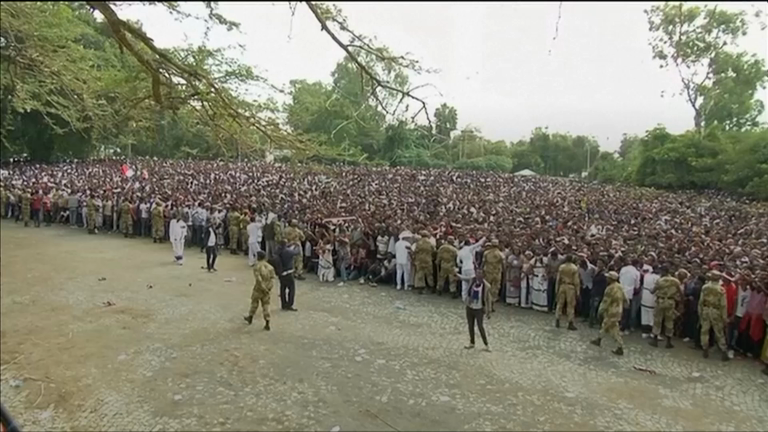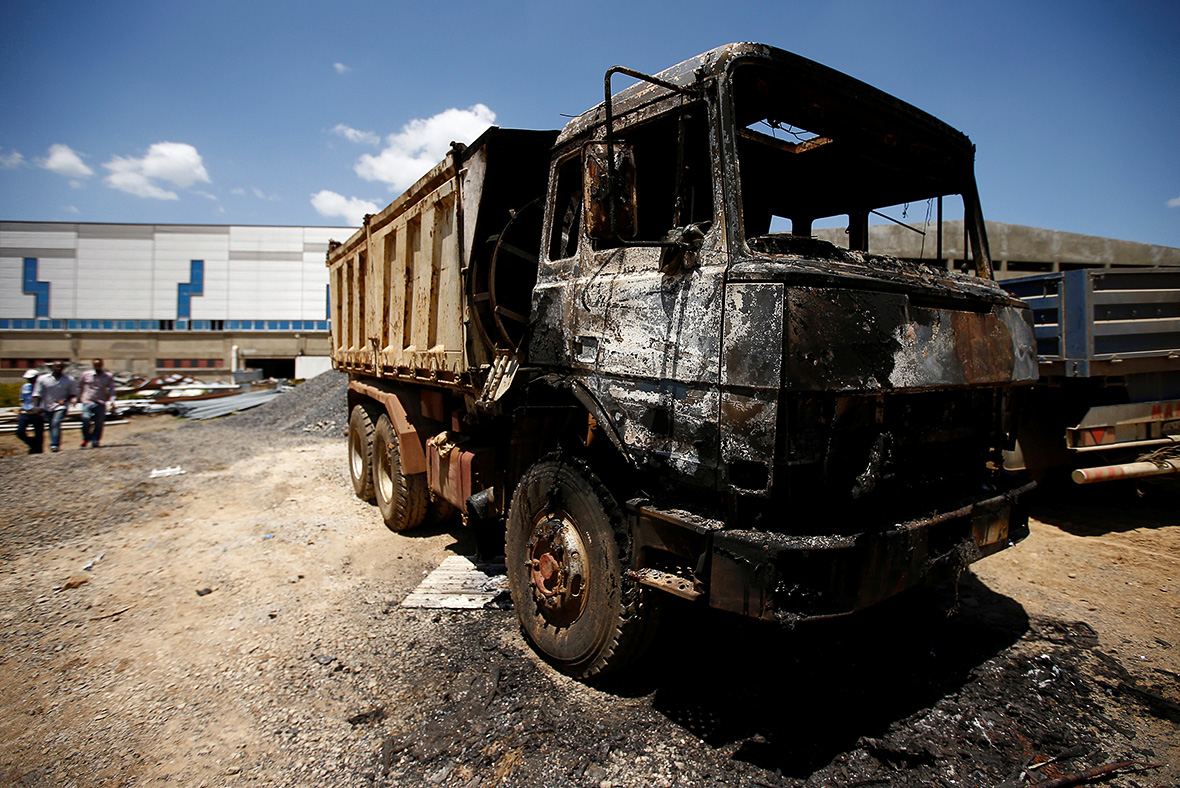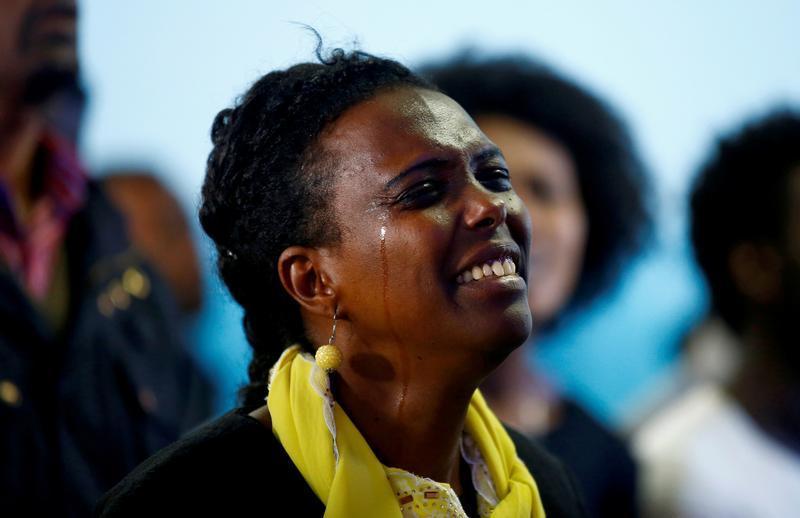Jawar Mohammed: This is why Oromo people don't care about cabinet reshuffle
Exclusive interview with executive director of Oromia Media Network, banned as Ethiopia declared emergency.
Ludovica Iaccino By Ludovica Iaccino
November 3, 2016 17:25 GMT
Updated 4 hr ago
CLOSE
Embed Feed Ethiopia declares state of emergency after civil unrest Reuters
The Ethiopian government recently reshuffled its cabinet in a move seen by some as a result of months of anti-government protests. The parliament approved the list of 21 ministers proposed by Prime Minister Hailemariam Desalegn, who said the appointments were based on people's skills rather than their political affiliations.
More from IBTimes UK
Oromia Media Network executive Jawar Mohammed believes Ethiopia wants him dead
Ethiopia 'releases 2,000 detainees' weeks after state of emergency declared
Ethiopia blames international community as troops withdraw from Somalia in face of al-Shabaab threat
Why advertise with us
As some key posts were given to ethnic Oromo, some claimed the reshuffle was part of measures the government said it would take to reduce grievances expressed by some ethnic groups.
In October, Ethiopia declared a six-month-long state of emergency following unrest in Oromia, and occasionally in Amhara.
The response to the protests, labelled as the biggest anti-government unrest Ethiopia has witnessed in recent history, has resulted in the death of more than 500 people since November 2015, a figure the government later confirmed.
In Oromia, people demonstrated against perceived disenfranchisement and lack of inclusion in the political process as the government is dominated by the Tigray minority. They also called for an end to land grabbing, claiming Oromo farmers are forcibly evicted from their farms.
Government reshuffle 'no meaning for Oromos'
Jawar Mohammed, executive director of Oromia Media Network (OMN), banned under the state of emergency, explained Oromo people are calling for a radical regime change, not a government reshuffle.
"People are demanding a new democratic government elected by the people. To really meet protesters' demands, the government should release political prisoners, they should remove the military from villages, towns and universities and start a dialogue on a transition to a more democratic government," he told IBTimes UK.
Mohammed, who lives in the US, also claimed Ethiopians have not been affected by the state of emergency , with the exception of a restriction on internet access.
"Oromia has been under a state of emergency for the last 12 months, the military is there, all the civil and political rights have been suspended, people have been arrested," he alleged.
"Yes, some media outlets have been banned, but this is nothing new. OMN has been jammed some 20 times since March 2014. Even before the state of emergency, they were already arresting people, breaking down satellite dishes and jamming our transmission, what they did now was to officially admit what they were already doing and reassure investors that they are taking measures, beefing up security."
Ethiopia Oromo Oromia
People walk near a burnt-out truck in the compound of a textile factory in the town of SebetaTiksa Negeri/Reuters
Attacks on foreign-owned companies
During anti-government protests, Oromo people attacked foreign-owned factories in Oromia, acts of violence that could result in a reduction in investments in the country.
Ethiopia strongly condemned the attacks, which it blamed on "anti-peace forces who aim to destabilise the country." The government also claimed the situation in the country has gone back to normal since the state of emergency was implemented.
However, Mohammed claimed protests have halted only because it is harvesting season and rallies are bound to restart. He also said people will, once again, attack foreign-owned factories as they were allegedly "built on lands that were illegally taken from farmers or lands owned by the ruling party."
"These are not xenophobic attacks. In fact, protesters have not touched a single investor physically," he said. "The targets are strategically chosen because people need to now that investments in Ethiopia, until a democratic system is in place, is not safe.
Government's position
When contacted by IBTimes UK for comments on the allegations, a spokesperson for the Ethiopian embassy in London dismissed Mohammed's claims as "unsubstantiated information".
The diplomat also alleged Mohammed and other members of the disapora community could have links to the Oromo Liberation Front, which the Ethiopian government labelled as a terrorist organisation that carried out violent acts in Ethiopia, Somalia and Kenya.
Official press release on state of emergency
Ethiopia's Prime Minister Hailemariam Dessalegn declared a six-month nationwide state of emergency on Sunday, 9th October, according to the provisions established under the constitution of the Federal Democratic Republic of Ethiopia, saying months of unrest threatened the nation's stability.
"A state of emergency has been declared because the situation posed a threat to the people of the country," Hailemariam said. He added that "Vital infrastructure, businesses, health and education centres, as well as government offices, and courts have been destroyed". There have been attacks on businesses, many of them foreign-owned, including farms growing flowers for export.
Attorney General Getachew Ambaye said that the aim of the decree is to maintain peace and order and would permit authorities to stop and search those suspected of involvement in activities contributing to the deterioration of law and order.
It also bars the "preparation, distribution and exhibition of material that could incite further chaos", he said in an official announcement. The measures did not contain curfews, but Getachew said the command post, chaired by the Prime Minister, set up to oversee the implementation of the legislation, would determine where and when to impose curfews "should the need arise". The decree went on to state that human rights would be respected and that diplomatic missions and international organisations would be protected as per the Vienna Convention.
"Failure to observe these measures would lead to imprisonment according to the law."
Exclusive interview with executive director of Oromia Media Network, banned as Ethiopia declared emergency.
Ludovica Iaccino By Ludovica Iaccino
November 3, 2016 17:25 GMT
Updated 4 hr ago
CLOSE
Embed Feed Ethiopia declares state of emergency after civil unrest Reuters
The Ethiopian government recently reshuffled its cabinet in a move seen by some as a result of months of anti-government protests. The parliament approved the list of 21 ministers proposed by Prime Minister Hailemariam Desalegn, who said the appointments were based on people's skills rather than their political affiliations.
More from IBTimes UK
Oromia Media Network executive Jawar Mohammed believes Ethiopia wants him dead
Ethiopia 'releases 2,000 detainees' weeks after state of emergency declared
Ethiopia blames international community as troops withdraw from Somalia in face of al-Shabaab threat
Why advertise with us
As some key posts were given to ethnic Oromo, some claimed the reshuffle was part of measures the government said it would take to reduce grievances expressed by some ethnic groups.
In October, Ethiopia declared a six-month-long state of emergency following unrest in Oromia, and occasionally in Amhara.
The response to the protests, labelled as the biggest anti-government unrest Ethiopia has witnessed in recent history, has resulted in the death of more than 500 people since November 2015, a figure the government later confirmed.
In Oromia, people demonstrated against perceived disenfranchisement and lack of inclusion in the political process as the government is dominated by the Tigray minority. They also called for an end to land grabbing, claiming Oromo farmers are forcibly evicted from their farms.
Government reshuffle 'no meaning for Oromos'
Jawar Mohammed, executive director of Oromia Media Network (OMN), banned under the state of emergency, explained Oromo people are calling for a radical regime change, not a government reshuffle.
"People are demanding a new democratic government elected by the people. To really meet protesters' demands, the government should release political prisoners, they should remove the military from villages, towns and universities and start a dialogue on a transition to a more democratic government," he told IBTimes UK.
Mohammed, who lives in the US, also claimed Ethiopians have not been affected by the state of emergency , with the exception of a restriction on internet access.
"Oromia has been under a state of emergency for the last 12 months, the military is there, all the civil and political rights have been suspended, people have been arrested," he alleged.
"Yes, some media outlets have been banned, but this is nothing new. OMN has been jammed some 20 times since March 2014. Even before the state of emergency, they were already arresting people, breaking down satellite dishes and jamming our transmission, what they did now was to officially admit what they were already doing and reassure investors that they are taking measures, beefing up security."
Ethiopia Oromo Oromia
People walk near a burnt-out truck in the compound of a textile factory in the town of SebetaTiksa Negeri/Reuters
Attacks on foreign-owned companies
During anti-government protests, Oromo people attacked foreign-owned factories in Oromia, acts of violence that could result in a reduction in investments in the country.
Ethiopia strongly condemned the attacks, which it blamed on "anti-peace forces who aim to destabilise the country." The government also claimed the situation in the country has gone back to normal since the state of emergency was implemented.
However, Mohammed claimed protests have halted only because it is harvesting season and rallies are bound to restart. He also said people will, once again, attack foreign-owned factories as they were allegedly "built on lands that were illegally taken from farmers or lands owned by the ruling party."
"These are not xenophobic attacks. In fact, protesters have not touched a single investor physically," he said. "The targets are strategically chosen because people need to now that investments in Ethiopia, until a democratic system is in place, is not safe.
Government's position
When contacted by IBTimes UK for comments on the allegations, a spokesperson for the Ethiopian embassy in London dismissed Mohammed's claims as "unsubstantiated information".
The diplomat also alleged Mohammed and other members of the disapora community could have links to the Oromo Liberation Front, which the Ethiopian government labelled as a terrorist organisation that carried out violent acts in Ethiopia, Somalia and Kenya.
Official press release on state of emergency
Ethiopia's Prime Minister Hailemariam Dessalegn declared a six-month nationwide state of emergency on Sunday, 9th October, according to the provisions established under the constitution of the Federal Democratic Republic of Ethiopia, saying months of unrest threatened the nation's stability.
"A state of emergency has been declared because the situation posed a threat to the people of the country," Hailemariam said. He added that "Vital infrastructure, businesses, health and education centres, as well as government offices, and courts have been destroyed". There have been attacks on businesses, many of them foreign-owned, including farms growing flowers for export.
Attorney General Getachew Ambaye said that the aim of the decree is to maintain peace and order and would permit authorities to stop and search those suspected of involvement in activities contributing to the deterioration of law and order.
It also bars the "preparation, distribution and exhibition of material that could incite further chaos", he said in an official announcement. The measures did not contain curfews, but Getachew said the command post, chaired by the Prime Minister, set up to oversee the implementation of the legislation, would determine where and when to impose curfews "should the need arise". The decree went on to state that human rights would be respected and that diplomatic missions and international organisations would be protected as per the Vienna Convention.
"Failure to observe these measures would lead to imprisonment according to the law."




